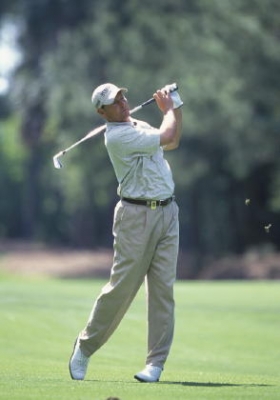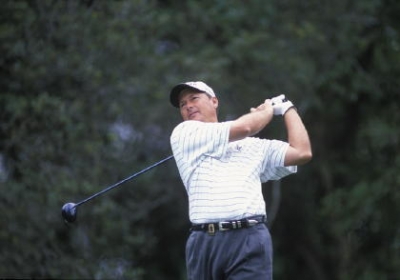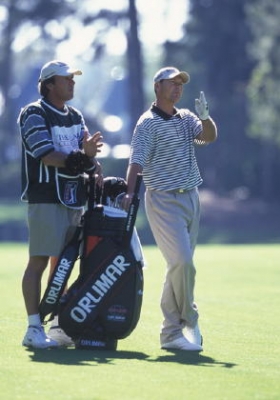By Jeffrey A. Rendall, Photos By Larry Lambrecht
ORLANDO, FL -- Who says you can't improve with age? You'd like to think time and the aging process benefits only fine wine, but in the right circumstances, the principle also applies to professional golfers. Though there's certainly been a youth movement on the PGA Tour in recent years, there's also been a trend towards the Tour's 'over 40' players achieving continued success. Even the 'over 45' crowd has not only shown signs of life, but real competitiveness.
45 year-old John Cook is one of the veteran players taking advantage of hardened Tour experience and improved outlooks on physical fitness to compete neck-and-neck with players half his age. 2002 was one of Cook's finest seasons on the PGA Tour: he finished 35th on the money list, bolstered his world ranking, and earned an invitation to this year's Masters Tournament. He says he'd like to win on Tour again, and if recent winners' trends are any indication, he's got as good a chance as any to do just that, despite the accumulated physical wear and tear from his near quarter-century on Tour.
There's good reason for optimism on his part, because experience works.
Thus far this season, the only sub 30-year-old winner has been Tiger Woods. Whereas 2002 was a record-breaking year for first-time winners and the younger players on Tour -- in 2003, age is all the rage. One 'over 45' player even received a winner's trophy -- Scott Hoch, who outlasted Jim Furyk in a playoff to win at Doral.
Curtis Strange said that seasoned players can remain competitive if they'll "get their butts off the couch and practice." And if there's a sport where turning 40 doesn't automatically mean a trip to the Hall of Fame or the post-career convalescent home, it's golf. The Champions Tour may be the next step for players turning 50, but that doesn't preclude them from competing with the younger guys on the regular Tour, and even having a chance to win after moving-on to the senior circuit.
Earlier this month, Cook shared his thoughts on his new Sunday morning TV work, the re-emergence of 'over 45' players on Tour, Annika Sorenstam's playing in a PGA Tour event, the Masters controversy and what could be done to even things out in tournament course set-ups:
GTMA: You've been pretty busy lately, with playing on Tour and working the new TV show. For those who haven't had a chance to catch it, what's it about?
Cook: It's called 'PGA Tour Sunday,' on USA Network -- and it airs every Sunday from 11 a.m. - 12 p.m. EST. It's a pretty quick-paced, tightly cut show, because we do it almost entirely live.
The idea is 'What's going on today?', so it's event specific. It'll take a look at what's happened at the tournament so far, and provides some insight into what's to come on the final day -- before the telecast starts.
We'll also look at the other tours, and what's going on there -- the Champions Tour, Nationwide, European, LPGA -- we'll look at 'em all.
Fran Charles is the host, and Tim Rosaforte (of Golf Digest) and I are the 'expert' analysts. Funny how all of a sudden you become an 'expert' -- at least without a media credential.
But it's a lot of fun, and very challenging, doing live television.
GTMA: As an 'analyst' on the show, is there a certain perspective you're trying to present?
Cook: I pretty much present an active player's view, someone who's competing and involved. You know, what today's players may think about certain issues, and what's going on.
Tim's always got some angles and sources he'll bring to the show -- some scuttlebutt.
Together, it's a little bit different spin on the game that you might not get from just watching the telecast.
GTMA: We're starting to see a lot of players in your age group doing some TV work. But it's also obvious that you can still play. The recent article in Golf Digest quoted you and a few of your '45 and over' colleagues on how you keep your competitive edge. What's the secret to remaining in the game at your age?
 |
| Photo By Larry Lambrecht. |
Cook: I think there're a few things. First, you know where your game is -- where you think you can be competitive, and where it just makes no sense to go and play.
Then it's a matter of staying active, staying competitive. We've played competitively all our lives, and you never lose that will to win and compete.
And, if you keep active, develop a fitness program, and keep your body in shape... because at this age, your body shows a little bit more wear and tear than a 25 year-old. That's not an excuse -- you can still keep your body in shape, even through the little aches and pains, and still be able to compete.
For most of us, our home life is pretty well on the way. My kids are grown and gone basically. A lot of guys' kids are in their teen years, or at least getting into school.
That leads to a stable life at home, so you've got some time to work on your game. The kids know now that when Dad leaves, he's coming home at some point. He's not leaving to leave -- he's leaving to go to work and come back. I think we all just feel, when things are stable and happy at home that you can go play and then come back and be Dad again.
GTMA: Can you expand on the places you think you'll be most competitive?
Cook: It might be easier to name the places where I won't be competitive -- I'm not going to be competitive at Riviera, and places like Bethpage (New York, site of the 2002 US Open). I can be competitive in Hawaii (for the Sony Open), and at the Hope, the Colonial, and some other places where the courses aren't 8,000 yards long with soft fairways and hard greens.
GTMA: What was it like to see the veteran players do well at the recent World Match-Play Championships?
Cook: It was outstanding. That golf course (speaking of La Costa) was a long, long, big hitters, big bombers golf course. To see Jay (49 year-old Jay Haas) play well -- and actually having him play Nick Price (46 years old), I didn't want to see that -- I wanted to see them somewhere else in the draw so they could meet farther down the line.
It was also nice seeing Scott Hoch get pretty far into it.
It probably took Tiger's best scoring match to beat Scott Hoch. That says a lot for guys in their forties. You hear, deservedly so, that this next generation is young and strong, and they've done this, and they've done that. But they haven't won a lot of golf tournaments -- they've won a couple.
And, the guys with experience who're winning all these tournaments, we're still part of that group.
GTMA: Of the 'Over 45' players, who's most likely to break through with a major championship?
Cook: I can still see Nick Price winning a major.
You won't see any of us really contend at Augusta, unless it's firm and fast. If it's firm and hard, and the greens are firm and hard, and they don't get any rain for the week, I think all of us could contend there -- just from experience and knowing how to play the golf course.
Then Olympia Fields (Olympia Fields, Illinois, site of the 2003 US Open) isn't a really long golf course. And Oak Hill (Rochester, NY, site of the 2003 PGA Championship) is old and traditional. It's got some added length, but it's still a good ball-strikers type of golf course. Hopefully they haven't added so much length that it takes away from maneuvering the ball off the tee, which is what we see a lot of nowadays.
It seems like now, you just have to hit straight bombs, and you don't have to place it in the fairway -- you just kind of 'slug' it in the fairway.
I think Oak Hill's going to be a great test, where you have a lot of guys contending, instead of just a couple.
GTMA: With guys like Jay Haas being 49, but still very competitive on the PGA Tour -- do you think it would be to his benefit to remain on the regular Tour, even after turning 50?
 |
| The 'PGA Tour Sunday' Lineup. Cook is on the right. |
Cook: Again, there are certain places where we can be competitive -- and that's a handful. You have to wait for your shot at those types of places.
At the same time, I think the Champions Tour would benefit from having some of these guys, who're only competitive in certain places on the PGA Tour -- to be able to play on the Champions Tour. They've certainly got some outstanding stars and some big names on that tour -- but I think the corporate sponsorship would like more competitive events rather than having more and more shooting better scores.
The consistent winners, and the top 12 - 15 players are very competitive. Maybe the top 30 players. But after that, there's really a drop-off.
To see Jay playing as well as he is, and about to move on, and Stad's (Craig Stadler) coming out, and Peter Jacobsen -- you would think those guys could've helped out a couple years ago when the Champions Tour was floundering a bit, in terms of offering competitive fields.
I'm not saying they'd go in and dominate -- there's too much talent on that tour to do that. But, my thought has always been, when you're 45 years old, and you're still a little bit competitive on the PGA Tour, but not every week -- and then the Tour basically says 'if you don't finish in the top 125, see ya...'
'Thanks for 25 years worth of work, and playing in all our tournaments, then we're going to put you to pasture for five years. Please come out and support our Champions Tour.'
Well, that's absurd. Why don't they use these players, while they still want to be competitive? Maybe make the Champions Tour 45-55. Or, if you're over 55 and want to keep playing, then keep playing as long as you're competitive. Then do something else.
GTMA: I've never heard it put that way.
Cook: Being on the policy board, we've talked about that a lot. Of course, we're always shot down.
Of course we (the 'over 45s') can still be competitive in places on our Tour. But there's a lot of room for those players to help out the Champions Tour, too.
GTMA: Would it be good for the game of golf to have someone other than the number one player in the world win some of the bigger tournaments?
Cook: Yes, I think so -- if anything, to show that not every course needs to be set-up the way they often are these days. It's almost demoralizing going to these old, great golf courses that have added so much length, that it just becomes a slug-fest. They're basically eliminating the competition -- only about four or five guys have that type of game where they can 'slug it' with some control.
I mean, the other guys can still play okay, and compete, but to actually have a chance to win... it's very few and far between. Like last year at a Bethpage, where it's eight billion yards long, and you've got to fly it 270 to even reach the fairway... you know, Nick Price and Scott Hoch can finish in the top 15 or 10 at places like that, but they've got no realistic chance to win.
What makes for good competition is having 20 guys with a chance to win on Sunday. And you've got to have a golf course that'll allow that, instead of weeding everybody out and having Tiger and three other guys, where pretty much the outcome is already done.
But if you've got a guy with some experience on a golf course where Tiger doesn't have a huge, huge advantage -- you're going to see a lot of different guys in there.
Look at what Bob May did at Valhalla -- you're going to see more of that.
GTMA: True. But didn't relatively short hitting, 'almost 40' Jeff Maggert have a shot to win last year at Bethpage? He was up there with the leaders going into the final round.
Cook: Yeah, but you know what I think happened -- the course just caught up to him. He had to be so good, and so precise, and I think he just wore out. He did a great job staying up there for so long, but the golf course finally got to him.
 |
| Photo By Larry Lambrecht. |
GTMA: Obviously a lot of the controversy over course set-up is because guys are simply hitting the ball so far now. Whether it's the ball, or the drivers, or both -- some say something has to give, where equipment's concerned. Where do you stand?
Cook: I think equipment's at the limit. Somebody needs to step up, whether it's the PGA Tour coming forward and finally saying 'Hey, on the Tour, this is as far as anything goes. This is where we're going, and this is as far as it's going to go. Everything that's out there right now is fine, and that's it.'
That's the only thing that can be done, this side of taking the top five or ten players of the week, and testing their equipment -- because there's definitely some stuff that's borderline.
NASCAR does it, and they don't have a problem with quasi-legal equipment. They've DQ'd some people who've won or been in the top five for whatever reason -- their car was too light, or too heavy.
Stopping short of that, I think the Tour needs to step in, because the USGA testing is so outdated, it makes no sense. We've got to do something to please ourselves, because the longest players are now getting 20-30 more yards, and that's just not right. It's not fair, and it's not right.
GTMA: Pete Dye and most of the architects I've talked with have said a 'Tournament Spec. Ball' might be the way to go. After all, all major sports seem to play one 'type' of ball, and play revolves around that. Would you be in favor of that?
Cook: Well, no. It's because all the balls out there are different. I play a ball that fits my characteristics -- and mine are different than say, Tiger Woods, even though we're with the same company (Nike). Having one ball may eliminate even more guys, because then you've got to start adjusting yourself to the golf ball, which I don't think is right.
That being said, I do think the balls out there right now -- that's as far as they should go. With the current high level of research and development, where else can they go?
GTMA: So why would equipment testing work, where current methods fail?
Cook: Without naming companies, there's definitely a 'driver war,' to determine which one's going the farthest. Really, with the combination of the driver faces and the golf balls, you're seeing these 'launch machines' where you're getting the absolute pinnacle in technology, and where it's going.
Testing equipment would help to ensure it doesn't get to the point where it fundamentally changes the nature of the game.
GTMA: How has it changed golf right now?
Cook: I would love to see golf courses where doglegs come back. These courses have gotten so long that they've taken the doglegs out -- you don't have to fit the ball in the fairway anymore.
If you go to Hawaii (Waialae Country Club, site of the Sony Open) -- now that's a ball striker's golf course, with doglegs everywhere. And Colonial. Riviera used to be -- it isn't anymore. You get to Muirfield (Village, site of the Memorial Tournament in Dublin, Ohio) and get it nice and firm and fast -- and then try to put these thin-faced, hot-balled drives in the fairway. You can't do it, so you've got to hit three-woods and two-irons to place the ball in the fairway.
Now you've got 30 guys who have a chance to win.
Unfortunately, I think they're going the opposite way -- 180 degrees off in the other direction.
GTMA: You've mentioned Colonial a few times, and obviously the 'hot' topic of the day is Annika Sorenstam playing a PGA Tour event -- do you think the fact that Colonial does cater to more of a 'placement' type player -- do you think that's going to work in her favor?
Cook: Not really, because I think that 265 number (her reported average driving distance) that they're throwing out....
GTMA: You think it's bogus?
 |
| Photo By Larry Lambrecht. |
Cook: I think it's bogus.
Let me clarify -- I think she hits it solid, and I think she hits it good. I grew up on a course that hosts an LPGA major, and they've never played it close to 6500 yards, I can guarantee that -- because I've watched it for 30 years.
So I think she'll have problems with the length of the course at Colonial, I really do.
I think what will keep her in the game is her being as competitive as she is, and knowing how to score. But what's a respectable score there? If she shoots 72-75, that would be very respectable, but that's still going to miss the cut by five to ten shots.
GTMA: Do you think it's good for the game to have an LPGA player playing in a PGA Tour event?
Cook: No. Absolutely not. What's it going to prove? I just don't see where they're going with it.
I don't get it -- unless some guy can go and compete with them, what does it prove to have a woman come and play on the PGA Tour?
That's even more absurd -- having some guy think he can try to play the women's Open. I don't see the purpose.
It's not like the tournament really needs a big boost in the arm, because The Colonial is The Colonial. It's one of the great tournaments of the year, with one of the best fields of the year on one of the best courses of the year, with a great sponsor.
What Annika does on the LPGA Tour is outstanding. She can play the game of golf, and there's no question about that. But what she does, and what we do, are apples and oranges. It's not really even a topic of discussion, because it's absurd to compare. I don't see any good that's going to come out of it.
I pull for her, because I know her, and she's great. She's well respected and a very likeable person -- but I just don't understand what it'll prove to have her play in a PGA Tour event.
GTMA: The Tour's lost some events in recent years -- here in Virginia, we lost the Michelob Championship... do you see losing some corporate sponsorships as being a problem on the PGA Tour?
Cook: I think the Tour needs to develop and maintain a lasting relationship with sponsorship partners that are in it for the long haul -- a 'Ford' type of environment with some of the other big corporations that have been good, stable partners for a long time.
Creating those lasting relationships, and finding out how we can make them better and last longer, instead of one to two to three year hits.
We all need to work a little harder on making the sponsors happy with their product, and what they're spending their money on.
GTMA: Is that going to be harder to do, with the Tour becoming somewhat divided between those events with Tiger, and those without?
Cook: There's a difference, but what people fail to realize is that obviously with Tiger in an event, the ratings will go up -- but even in a non-Tiger event, the ratings are up as well. So there's a lot of good product out there, if people just want to go watch.
If you want a comparison of TV ratings, well, that's not really fair. Golf, as a sport, is going up -- or leveling -- where every other sport, except NASCAR is declining. So, if you look at a particular tournament -- their ratings may be down, but they'll have record attendance every year. I think that fact needs to be drawn out as well.
 |
| Photo By Larry Lambrecht. Note: John Cook is now with Nike. |
There's more to the Tour than just Tiger Woods.
GTMA: As far as the average player goes, he doesn't worry about corporate sponsorship -- but he does think about how expensive the game is getting. Do you see the overall affordability of golf as a problem?
Cook: No question. There're ways of building golf courses for minimal amounts of money, and make 'em playable, affordable and accessible to everybody -- and make 'em fun to play, where people want to come back.
There are also places for those private clubs that just want to have one clientele, their membership. That's fine too.
But there also should be room for the public muni player to have a good place to play, where they'll want to go back, and they'll be able to get a tee time -- where they won't have to spend a couple hundred bucks to go and play.
GTMA: What's making it so expensive?
Cook: Course conditioning, mostly. Developers want big courses with big fairways and greens, which means lots of grass, which means lots of maintenance and a big budget, which means all this, and all that...
A lot of 'em want houses on the courses, and potential homebuyers want to look at green grass. It costs a lot to maintain it in the condition it needs to be in to keep people happy.
There's got to be a way to get everybody on the same page, and make golf affordable, and make it a nice experience for everybody.
GTMA: Speaking of finding common ground, what're your thoughts on the Augusta National situation?
Cook: As a member of the PGA Tour, I'm honored to be invited, and I've earned my way into the tournament.
Golf is what I do, and it's how I make a living. I play the game for two reasons -- for my family, and because that's what I do.
The organization protesting Augusta National does not represent mainstream America, does not represent my two college aged, college attending daughters. They don't speak for the majority of people.
Of course, you'd like to see, and at some point there will be, a female member at Augusta, just like there'll be a female President of the United States -- but it will be on terms that nobody can control except the membership at Augusta National.
I think the point that most people miss is that Augusta National's not a 'men only' club. Women do play there, and I think that fact gets lost in the discussion. There are 'men only' clubs where women can't even come in the front gate.
Someday, a woman will be invited to join Augusta, and they can put up the couple hundred grand, and get that bill at the end of year, and divvy it up -- you know, here's another couple hundred... It's not a freebie -- they're all dues paying members there. I just don't see the point of all this.
GTMA: Golf's largely avoided controversy of this type for some time. Do you think it was just due for some sort of scrutiny like this?
Cook: Not really. It's a golf tournament. There's so much more going on in the world... Events that I play in for abused women and children -- let's put some effort into issues like that rather than boycotting a golf tournament golfers love, and is a part of history. Let's put more effort into improving education, or something that's worthwhile.
 |
| Photo By Larry Lambrecht. |
John Cook is certainly putting effort into worthwhile endeavors, including staying competitive on Tour this season -- and hopes to win again soon. He says he's been in contention to win several times recently, but hasn't closed out very well -- something he's working towards improving.
And because of his TV work and various other commitments, he's decided to play a condensed schedule in 2003 -- no more than 20 events. He'll also try to qualify for the US Open. In limiting his playing time, he hopes to make the best out of the events he does play -- and judging by his time-honored determination to compete, he will.
Details:
For more information on John Cook, I suggest you access the PGA Tour's website: www.pgatour.com.
And for a broader sampling of photographer Larry Lambrecht's work, try his website: www.golfstock.net
| Related Links | Comments on this article? | |
|
Maryland National Golf Club Hollow Creek Golf Club Rocky Gap Resort PB Dye Golf Club in Ijamsville Whiskey Creek Golf Club |
E-mail Jeff Rendall, Editor: jrendall@golftheunitedstates.com |












